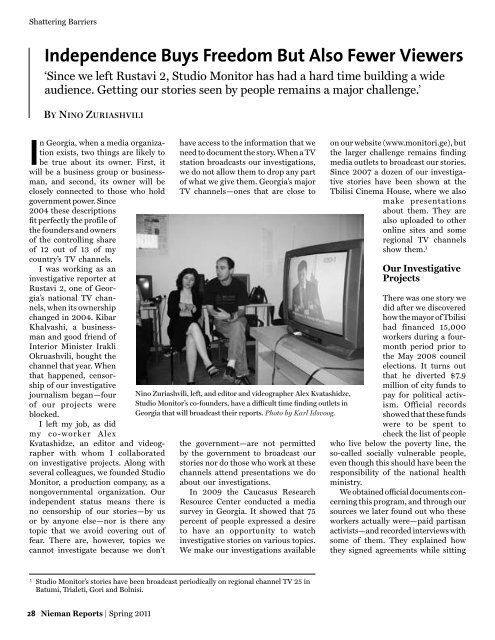N ieman Reports - Nieman Foundation - Harvard University
N ieman Reports - Nieman Foundation - Harvard University
N ieman Reports - Nieman Foundation - Harvard University
Create successful ePaper yourself
Turn your PDF publications into a flip-book with our unique Google optimized e-Paper software.
Shattering Barriers<br />
Independence Buys Freedom But Also Fewer Viewers<br />
‘Since we left Rustavi 2, Studio Monitor has had a hard time building a wide<br />
audience. Getting our stories seen by people remains a major challenge.’<br />
BY NINO ZURIASHVILI<br />
In Georgia, when a media organization<br />
exists, two things are likely to<br />
be true about its owner. First, it<br />
will be a business group or businessman,<br />
and second, its owner will be<br />
closely connected to those who hold<br />
government power. Since<br />
2004 these descriptions<br />
fit perfectly the profile of<br />
the founders and owners<br />
of the controlling share<br />
of 12 out of 13 of my<br />
country’s TV channels.<br />
I was working as an<br />
investigative reporter at<br />
Rustavi 2, one of Georgia’s<br />
national TV channels,<br />
when its ownership<br />
changed in 2004. Kibar<br />
Khalvashi, a businessman<br />
and good friend of<br />
Interior Minister Irakli<br />
Okruashvili, bought the<br />
channel that year. When<br />
that happened, censorship<br />
of our investigative<br />
journalism began—four<br />
of our projects were<br />
blocked.<br />
I left my job, as did<br />
my co-worker Alex<br />
Kvatashidze, an editor and videographer<br />
with whom I collaborated<br />
on investigative projects. Along with<br />
several colleagues, we founded Studio<br />
Monitor, a production company, as a<br />
nongovernmental organization. Our<br />
independent status means there is<br />
no censorship of our stories—by us<br />
or by anyone else—nor is there any<br />
topic that we avoid covering out of<br />
fear. There are, however, topics we<br />
cannot investigate because we don’t<br />
have access to the information that we<br />
need to document the story. When a TV<br />
station broadcasts our investigations,<br />
we do not allow them to drop any part<br />
of what we give them. Georgia’s major<br />
TV channels—ones that are close to<br />
Nino Zuriashvili, left, and editor and videographer Alex Kvatashidze,<br />
Studio Monitor’s co-founders, have a difficult time finding outlets in<br />
Georgia that will broadcast their reports. Photo by Karl Idsvoog.<br />
the government—are not permitted<br />
by the government to broadcast our<br />
stories nor do those who work at these<br />
channels attend presentations we do<br />
about our investigations.<br />
In 2009 the Caucasus Research<br />
Resource Center conducted a media<br />
survey in Georgia. It showed that 75<br />
percent of people expressed a desire<br />
to have an opportunity to watch<br />
investigative stories on various topics.<br />
We make our investigations available<br />
on our website (www.monitori.ge), but<br />
the larger challenge remains finding<br />
media outlets to broadcast our stories.<br />
Since 2007 a dozen of our investigative<br />
stories have been shown at the<br />
Tbilisi Cinema House, where we also<br />
make presentations<br />
about them. They are<br />
also uploaded to other<br />
online sites and some<br />
regional TV channels<br />
show them. 1<br />
Our Investigative<br />
Projects<br />
There was one story we<br />
did after we discovered<br />
how the mayor of Tbilisi<br />
had financed 15,000<br />
workers during a fourmonth<br />
period prior to<br />
the May 2008 council<br />
elections. It turns out<br />
that he diverted $7.9<br />
million of city funds to<br />
pay for political activism.<br />
Official records<br />
showed that these funds<br />
were to be spent to<br />
check the list of people<br />
who live below the poverty line, the<br />
so-called socially vulnerable people,<br />
even though this should have been the<br />
responsibility of the national health<br />
ministry.<br />
We obtained official documents concerning<br />
this program, and through our<br />
sources we later found out who these<br />
workers actually were—paid partisan<br />
activists—and recorded interviews with<br />
some of them. They explained how<br />
they signed agreements while sitting<br />
1<br />
Studio Monitor’s stories have been broadcast periodically on regional channel TV 25 in<br />
Batumi, Trialeti, Gori and Bolnisi.<br />
28 N<strong>ieman</strong> <strong>Reports</strong> | Spring 2011

















